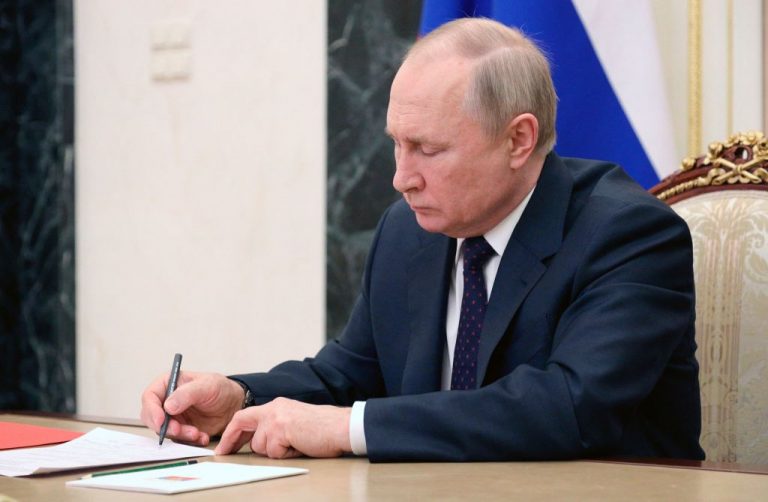As the Kremlin continues its invasion of Ukraine, Russian people and businesses across the globe are experiencing suppression and hatred, culminating in what some are saying is an alarming rise of “Russophobia.”
For instance, the Russian Tea Room, located in New York City, has seen patronage plummet following Putin’s invasion, as the owners grapple with anti-Russian hostility on social media, despite the Tea Room publicly condemning the Russian invasion.
“For 95 years, the [New York] institution’s history has been deeply rooted in speaking against communist dictatorship and for democracy,” a spokesperson for the Tea Room said in a statement, adding that, “Just as the original founders, Soviet defectors who were displaced by the revolution, stood against Stalin’s Soviet Union, we stand against Putin and with the people of Ukraine.”
The 95-year-old eatery grew to become a popular, extravagant hangout for tourists and entertainers alike, including Madonna, Salvador Dali, Frank Sinatra and more. It’s celebrating its 95th anniversary this year with a $275 menu of caviar and champagne, in addition to Faberge and “hand-blown eggs” for $30 to $600.
READ MORE:
- Russians Protest War in Ukraine, Thousands Arrested by Police
- McDonald’s Under Pressure to Follow Trend of Canceling Russia
- SWIFT Drops Russia But Sanctions May ‘Backfire’
Despite coming out against Putin, several social media users have targeted the outlet with disparaging posts online. One Twitter user reported that the Tea Room received “death threats,” while the New York Post was told that the staff were also being harassed online.
Success
You are now signed up for our newsletter
Success
Check your email to complete sign up
“What about the war you started? Got nothin to say?” a message read, shown on the Tea Room’s Instagram.
Other Russian restaurants and bars have also reported receiving similar remarks online, with one owner of one bar in San Diego telling CBS News that someone threatened to “come by and blow up the restaurant.”
Meanwhile, Ukrainian-themed diner Veselka, also located in New York, has seen increasing numbers of customers, who came to try the traditional borscht soup and show their support for Ukraine.
Russophobia
Concerns are being raised regarding anti-Russian sentiment, as several Russian-speaking citizens worldwide are facing discrimination due to a war they have nothing to do with.
According to a sociologist at the University of Sussex, Aleksandra Lewicki, there are people who are not part of the war being “targeted and removed from positions.”
“There’s a sense of a clear enemy, it’s Russians, from all walks of life, who are being targeted by racist hate crimes and derogatory comments,” she said.
Russian citizens in the Czech Republic, especially children, are also reported to be being harrassed, earning condemnation from Czech Prime Minister Petr Fiala.
Michelle Kelso, assistant professor of sociology and international affairs at George Washington University, told The Washington Post that there is “a lack of understanding about the conflict,” adding that people easily associate unaffiliated Russians with Putin.
“People get ratcheted up and that can lead to violence,” Kelso said.
Pro-Russian suppression
The Czech Republic and Slovakia have both criminalized pro-Russian support for the war in Ukraine.
Claiming to stand on the side of freedom and democracy, the governments of both countries introduced prison sentences for sympathizers of Moscow. The Czech Republic has made pro-Russian support for “genocide” punishable by three years in jail, a Czech media outlet reported.
Czech chief prosecutor Igor Striz warned that “it is a crime to publicly express support for the Russian war or to praise Russian leaders for intervening in Ukraine.” He also claimed that the government supports freedom of speech, but also said that “there are political limits on that speech.”
Citizens are encouraged by the authoritarian policies to report neighbors for their views on the war, and the police have already begun investigating dozens of people believed to be sympathetic towards Moscow.
“Czech law enforcement warns that public approval of Ukraine could be classified as a ‘crime of denial, questioning, approval and justification of GENOCIDE,’” the Ukrainian embassy of the Czech Republic posted on Twitter. “There are already the first two cases of detainees incriminated in this paragraph of the Criminal Code.”
Meanwhile, Slovakia has implemented a harsh punishment for people sympathetic towards Moscow, threatening people with prison sentences of 10 to 25 years.
The Latvian government has implemented a hotline for citizens to report those who sympathize with Moscow, while a university in Italy canceled a class on 19th century Russian writer Fyodor Dostoevsky, citing the war on Ukraine as the reason behind the cancellation. The decision has since been reversed.
The Cardiff Philharmonic went as far as to remove their Tchaikovsky performance over the Ukraine conflict, a move that the orchestra faced harsh ridicule over.
Russian pianist Roman Kosyakov received an email from officials of the Dublin International Piano Competition stating that it has banned Russian competitors from participating.
“I’m just curious, how will this stop the war?” Kosyakov posted on Instagram.


















